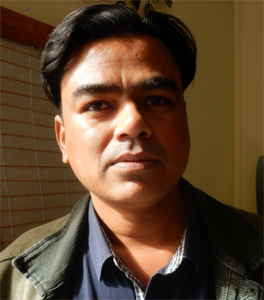Refugee writer fears for Burma’s democracy
Rohingya author and refugee Habibrahman, who fled repression and torture in his homeland and eventually found safety and a new life in Australia, fears a new round of ethnic cleansing will begin in Burma following the February 1 military coup.
‘Habib’, now living in regional Victoria, says the Burmese military have a history of violence and persecution against the Rohingya people.
 “My fear is that there will be a new campaign of ethnic cleansing against the Rohingya,” he said.
“My fear is that there will be a new campaign of ethnic cleansing against the Rohingya,” he said.
“They are cleansing our people time after time, and then pushing our people from the country. They are demolishing our historical existence,” Habib said.
“There is an ongoing genocide and I can’t stay silent. We have to make people aware. The international community needs to apply pressure,” he said.
Habib has escaped the Burmese military but he continues to advocate for the hundreds of thousands of his compatriots living in limbo in Bangladesh refugee camps and countless others struggling under the yoke of Burmese government oppression.
He says he fears it might be years before democracy returns to his homeland.
‘Habib’ has written a book about his own story and the suffering of his people to draw attention to their plight.
Titled ‘First They Erased Our Name’ – it tells of Habib becoming an outlaw in his own country and subsequent escape.
First published in French, he hopes it will bring fresh attention to what he describes as historical prejudices behind the plight of his long embattled people.
Habib says he also hopes the book preserves the story of the repression of the Rohingyas for future generations of his people.
“The Burmese Government have repeatedly launched these cleansing actions against my people – they did in 1978 and in 1991,” he said.
“We need the international community to hold them to account,” Habib said.
He said the Rohingyas had been seeking four things as part of an internationally brokered peace deal. But he says the coup has putt of any hopes of success.
“We need citizenship granted to our people; we need the restrictions we face on movement, education and employment lifted; we need to be relocated to our original villages; and, we need the rehabilitation and reconstruction of our towns,” Habib said.
“These four things need to be granted for anything to work. And we need a mechanism for this to be monitored. There are 300 to 400,000 people still living in Burma – half in concentration camps and the other half confined in villages.
“There are also military commanders that need to be prosecuted. Genocide and war crimes cannot be negotiated away – people have to be held accountable,” he said.
‘Habib’ was just 21 when he fled Myanmar’s Rakhine state and set off on a nine year journey that would bring him to Australia.
More than 800,000 Rohingya – a Muslim minority from Buddhist-majority Myanmar – have been forced across the border into Bangladesh since 2017 in the face of an alleged genocide.
Habib says the coup is just the latest episode in decades of repression and violence carried out against his people by the Burmese Government.
“As a Rohingya, I was oppressed, subject to arrest, forced labour and restriction of movement,” he said.
“That very persistently exists widely and discrimination and oppression and restriction is institutionalised,” Habib said.
In 2017 the Rohingya were caught in the crosshairs of a Myanmar military campaign in which the armed forces have been accused of mass killings and rapes. The United Nations has labelled the action as “having genocidal intent”.
Habib was just three years old when the military leader of his country declared the Rohingya were not one of the 135 recognised ethnic groups that formed the eight ‘national races’.
When he was a young boy he was placed in detention for the first time with his father. He says the institutionalised led to brutal acts committed by those in of authority in Burma.
“The conditions were not even suitable for an animal to live,” he said.
“In the prison, there was systematic torture … they have police who will randomly come down and beat you up… they beat me,” Habib said.
He left his homeland in 2000 and spent nine years living precariously in Malaysia.
“At the time I left Burma I was terrified. I had to struggle for my life… struggle to stay alive,” Habib said.
“I was just thinking that even If I can get one step away… then I will be safe and I will not be put back into prison or torture,” he said.
He arrived in Australia in 2009 aboard a boat.
“Once we got to Australia, I thought we didn’t need to worry for our lives. We had hope of a future,” Habib said.
“But the feeling changed after I was kept in detention for a long time.”
He spent 32 months in Australia’s immigration detention system, including on Christmas Island. In response to the delay, he staged a hunger strike on the roof of a Darwin detention centre and was convicted of damaging commonwealth property.
Despite being a recognised refugee, he remains stateless today, on a temporary visa with no passport. It has meant he had to turn down an offer to address the European Parliament with his story.
He is one of two million Rohingya now spread across the globe – a diaspora caused by repression and violence that has also seen as many as 40,000 killed in conflict over the past few years.












